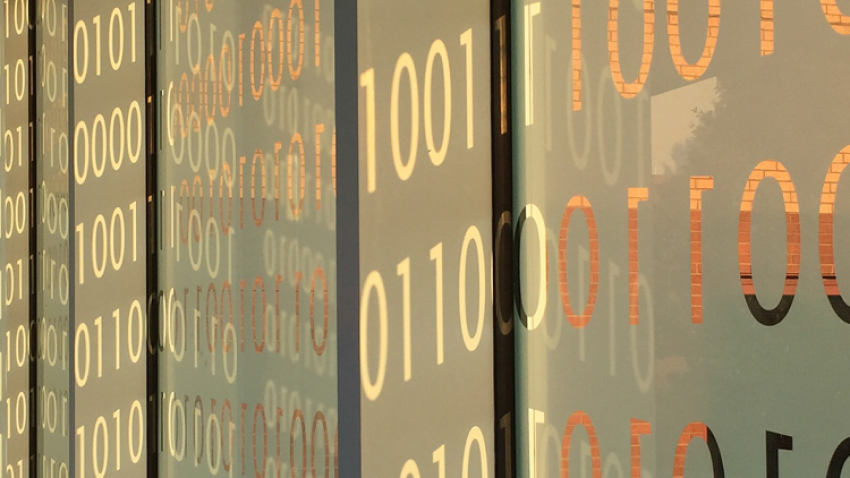
School of Computer Science Students Dominate at Demo Day
School of Computer Science (SCS) students won three of the four top prizes at the Institute for Information Security and Privacy's (IISP) Cybersecurity Demo Day. The research showcase was part of the IISP 16th annual Cybersecurity Summit on Oct. 4.
Sixteen Georgia Tech student groups entered the IISP Cybersecurity Demo Day poster and two-minute madness competition for the chance to win a total of $10,000 in prizes. These teams are automatically eligible to participate in the Demo Day program that offers $125,000 in total cash prizes and industry mentorship to help commercialize their work. The final winner will be chosen in the spring, but the summit was the participants’ first opportunity to receive feedback on their projects.
One of the goals of Demo Day is to help students get comfortable with presenting their work. To achieve this, each group presented their research as part of a two-minute madness round during the summit and then participated in a poster session where cybersecurity industry leaders and academics could ask questions.
“If you’re doing a Ph.D., you need to be able to do public speaking to get research funding,” said SCS Ph.D. student Carter Yagemann.
Attendees voted for the most promising project, which won the first prize. A panel of local chief information security officers selected the other two winners. New this year was a prize for a spot in CREATE-X.
- 1st prize $5,000 (chosen by popular vote): Home-based IoT Evaluation by Omar Alrawi (School of Electrical and Computer Engineering (ECE)) and Chaz Lever (SCS)
- 2nd prize $3,000 (chosen by panel of experts): LADIDS by Tohid Shekari (ECE), Christian Bayens (ECE), Morris Cohen (ECE associate professor), Lukas Graber (ECE assistant professor), and Raheem Beyah (ECE associate chair)
- 3rd prize $2,000 (chosen by panel of experts): Telephony Blacklist by Sharbani Pandit (SCS)
- CREATE-X Prize: Justitia by Carter Yagemann, Erkam Uzun (SCS), and Simon Pak Ho Chung (SCS research scientist), Wenke Lee (SCS professor)
Although they did not place in the top three, the other teams are still eligible to compete in the 2019 finale, and can attend a three-month training course on how to commercialize a product. Students who could not attend the summit can still join the program if they email Gloria Griessman.
Here are some SCS research highlights to look out for in the spring:
Project: Enabling Cross-Host Refinable Attack Investigation
Team: SCS Ph.D. students Yang Ji, Mattia Fazzini, Joey Allen, Evan Downing, and postdoctoral fellow Sangho Lee
Research Topic: Last year, the team introduced a tool that can replay a cyberattack. Now the team is expanding the tool to multiple hosts to get a complete picture of an attack.
Project: An Anonymous Survey System Supporting Real-time Authorization
Team: SCS Ph.D. student Jiahui Lu and Computational Science and Engineering student Haowen Zhang
Research Topic: Surveys are vital for businesses, but how can a restaurant be sure that a customer leaving a Yelp review has actually dined at the restaurant? This research creates an anonymous survey system with real-time authentication.
Project: Towards Measuring the Effectiveness of Telephony Blacklists
Team: SCS Ph.D. student Sharbani Pandit
Research Topic: Expanding off her research on generating a telephone hacking blacklist, now she is focusing on how to overcome caller ID spoofing, where copycat phone numbers look exactly like a victim’s own. Eventually, she hopes to build an Android app.
Project: Justitia: Privacy-Preserving and Recoverable Remote Biometric Authentication
Team: SCS Ph.D. students Erkam Uzun and Carter Yagemann, research scientist Simon Pak Ho Chung, and Professor Wenke Lee
Research Topic: Biometric data is more secure than any password, but replacing biometrics every time a user gets a new device is tedious. We need to be able to authenticate biometric data remotely while preserving users' privacy. The team created a remote authentication server that performs biometric matching over encrypted biometric data.
As computing revolutionizes research in science and engineering disciplines and drives industry innovation, Georgia Tech leads the way, ranking as a top-tier destination for undergraduate computer science (CS) education. Read more about the college's commitment:… https://t.co/9e5udNwuuD pic.twitter.com/MZ6KU9gpF3
— Georgia Tech Computing (@gtcomputing) September 24, 2024


